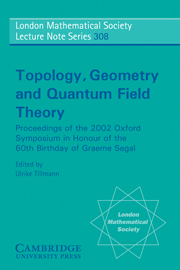 Topology, Geometry and Quantum Field Theory
Topology, Geometry and Quantum Field Theory Published online by Cambridge University Press: 06 November 2009
Abstract
We conjecture that index formulas for K-theory classes on the moduli of holomorphic G-bundles over a compact Riemann surface ∑ are controlled, in a precise way, by Frobenius algebra deformations of the Verlinde algebra of G. The Frobenius algebras in question are twisted K-theories of G, equivariant under the conjugation action, and the controlling device is the equivariant Gysin map along the ‘product of commutators’ from G2g to G. The conjecture is compatible with naïve virtual localization of holomorphic bundles, from G to its maximal torus; this follows by localization in twisted K-theory.
Introduction
Let G be a compact Lie group and let M be the moduli space of flat G-bundles on a closed Riemann surface ∑ of genus g. By well-known results of Narasimhan, Seshadri and Ramanathan [NS], [R], this is also the moduli space of stable holomorphic principal bundles over ∑ for the complexified group G; as a complex variety, it carries a fundamental class in complex K-homology. This paper is concerned with index formulas for vector bundles over M. The analogous problem in cohomology – integration formulas over M for top degree polynomials in the tautological generators – has been extensively studied [N], [K], [D], [Th], [W], and, for the smooth versions of M, the moduli of vector bundles of fixed degree co-prime to the rank, it was completely solved in [JK]. In that situation, the tautological classes generate the rational cohomology ring H*(M; ℚ).
To save this book to your Kindle, first ensure [email protected] is added to your Approved Personal Document E-mail List under your Personal Document Settings on the Manage Your Content and Devices page of your Amazon account. Then enter the ‘name’ part of your Kindle email address below. Find out more about saving to your Kindle.
Note you can select to save to either the @free.kindle.com or @kindle.com variations. ‘@free.kindle.com’ emails are free but can only be saved to your device when it is connected to wi-fi. ‘@kindle.com’ emails can be delivered even when you are not connected to wi-fi, but note that service fees apply.
Find out more about the Kindle Personal Document Service.
To save content items to your account, please confirm that you agree to abide by our usage policies. If this is the first time you use this feature, you will be asked to authorise Cambridge Core to connect with your account. Find out more about saving content to Dropbox.
To save content items to your account, please confirm that you agree to abide by our usage policies. If this is the first time you use this feature, you will be asked to authorise Cambridge Core to connect with your account. Find out more about saving content to Google Drive.